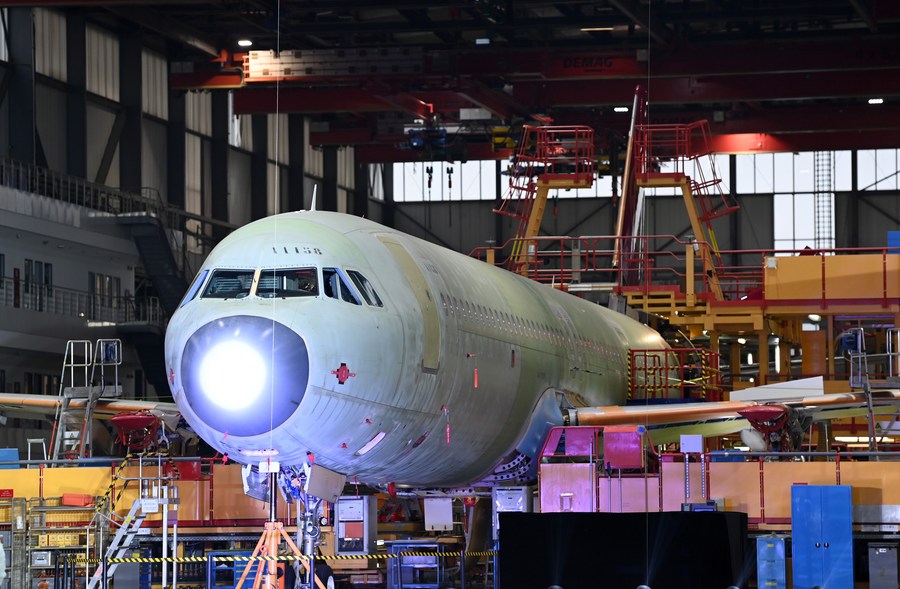Xinhua Commentary: China still a preferred destination for global investors

The first Airbus A321 aircraft is produced at the Final Assembly Line Asia (FALA) facility in north China's Tianjin on Nov. 9, 2022. (Xinhua/Zhao Zishuo)
BEIJING, Nov. 3 (Xinhua) -- Despite a fluctuation in its foreign direct investment (FDI), China remains one of the most attractive destinations for global investors thanks to its consistent opening-up drive bolstered by favorable policies.
Some foreign media reports have recently been focusing on the decline of China's FDI in the first nine months of 2023, citing analysts claiming that foreign companies are moving capital out of the country. Clearly, such reporting contradicts the general picture of China's foreign investment, its major economic indicators, and the consistent interest of most foreign firms in tapping the opportunity-rich Chinese market.
FDI in actual use on the Chinese mainland decreased 8.4 percent year on year to 919.97 billion yuan (about 128 billion U.S. dollars) in the first nine months. But this comparison is based on last year's record-high figure over the same period. China's actual use of foreign capital increased 8 percent year on year to 189.1 billion U.S. dollars in 2022, as the country remained the world's second-largest recipient of foreign capital.
FDI fluctuations are not uncommon for any country. It should be noted that the global environment for international business and cross-border investment remains challenging, and downward pressure on global FDI is expected to continue this year after a 12 percent decline last year, according to the World Investment Report 2023, which was released by the United Nations Conference on Trade and Development.
Despite the FDI decline, an increasing number of foreign firms are investing in China. Data from the Ministry of Commerce shows that 37,814 foreign-invested enterprises were established in China in the first three quarters, up 32.4 percent year on year.
It is worth noting that the structure of foreign investment has been optimized. Double-digit foreign investment growth has been reported in sectors such as high-tech manufacturing, medical equipment manufacturing, electronic and communication equipment manufacturing, and R&D and design services.
Over the past few decades, China has been widening its opening-up. A recent case in point was the inauguration of the Xinjiang Pilot Free Trade Zone (FTZ) in northwest China as part of the country's strategic move for promoting reform and opening-up in the new era. The FTZ will play a significant role in building a "golden channel" between Asia and Europe and a bridgehead for China's westward opening up.
At the third Belt and Road Forum for International Cooperation last month, China announced it would remove all restrictions on foreign investment access in the manufacturing sector, advance high-standard opening-up in cross-border services trade and investment, and expand market access for digital and other products in accordance with high-standard international economic and trade rules. China's Ministry of Commerce said the country will continue to shorten its negative list for foreign investment access. These favorable policies will be a continuous boon to foreign investors.
The results of a recent survey, conducted by the China Council for the Promotion of International Trade, of 700 foreign-funded companies in China speak volumes.
According to the survey report on the business environment for foreign companies in China in the third quarter, over 80 percent of the surveyed companies say they are satisfied with the business environment in China.
The survey also showed that 70 percent of the companies say their industrial chain layout in China will "remain stable," which is 4.57 percentage points higher than that in the second quarter, and 80 percent expect their yearly profits to increase or remain flat in 2023.
Strong interest in China has also been felt at various international expos. The upcoming sixth China International Import Expo in Shanghai has a larger business exhibition area and higher number of participating Fortune 500 and leading companies compared with previous editions. At the fourth Qingdao Multinationals Summit held in Shandong Province in October, a total of 194 foreign investment projects were inked, with a record combined value of 20.6 billion U.S. dollars.
In the first three quarters of 2023, the Chinese economy expanded 5.2 percent. The world's second-largest economy is expected to grow 5.2 percent in 2023 and 5 percent in 2024, according to a report released at the International Financial Forum in late October.
With its super-large market, strong industrial chain resilience, new business models and emerging innovation ecosystem as well as its unwavering commitment to broader opening-up, China will undoubtedly remain one of the most attractive overseas investment destinations for multinational companies.
- GLOBALink | Schneider says Chinese market remains important
- GLOBALink | From Dutch fields to Chinese soil: the blossoming journey of tulips
- CIIE promotion event held in Egyptian capital
- Interview: European truck giant eyes opportunities in China's high-quality development
- Schneider says Chinese market remains important

